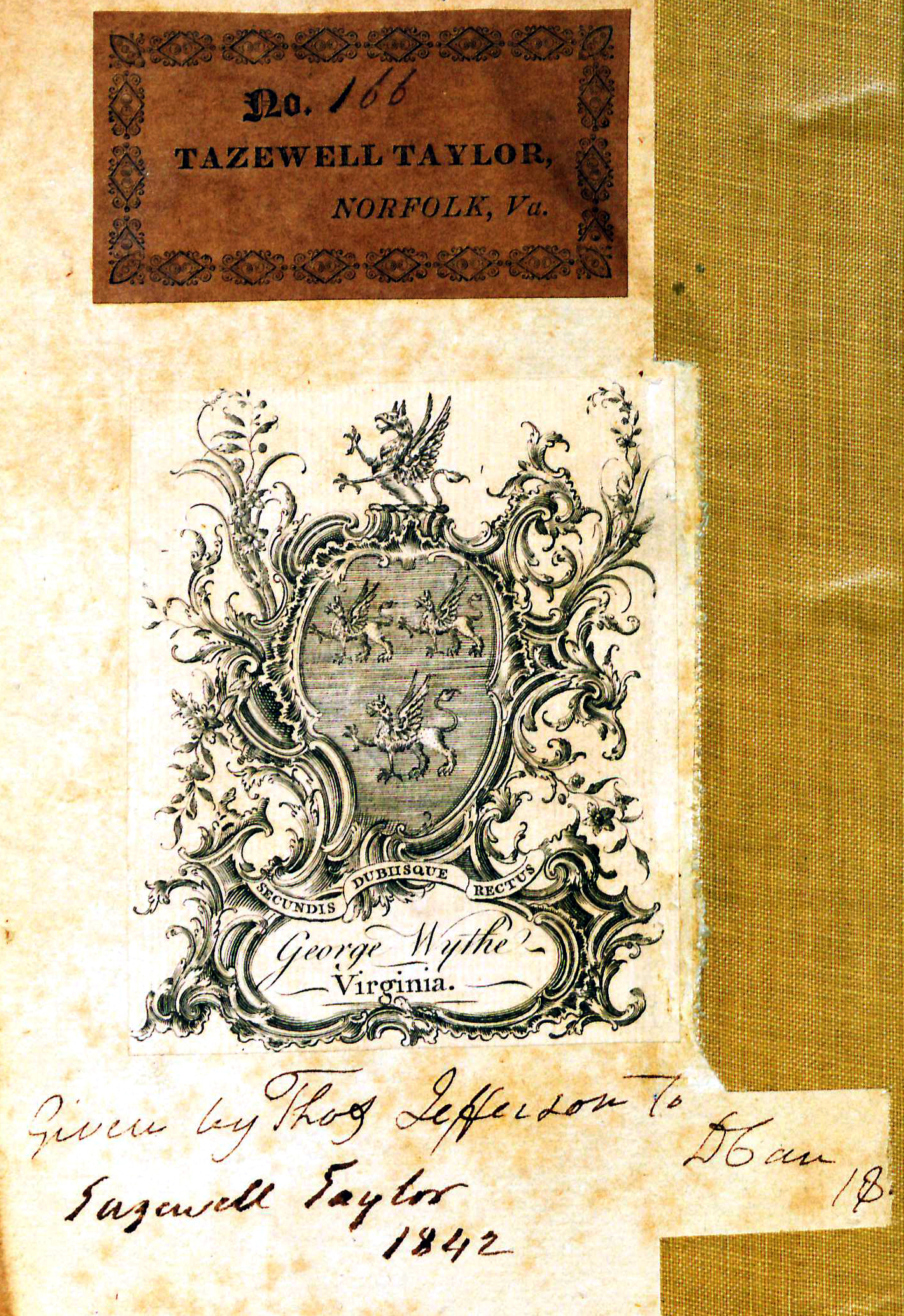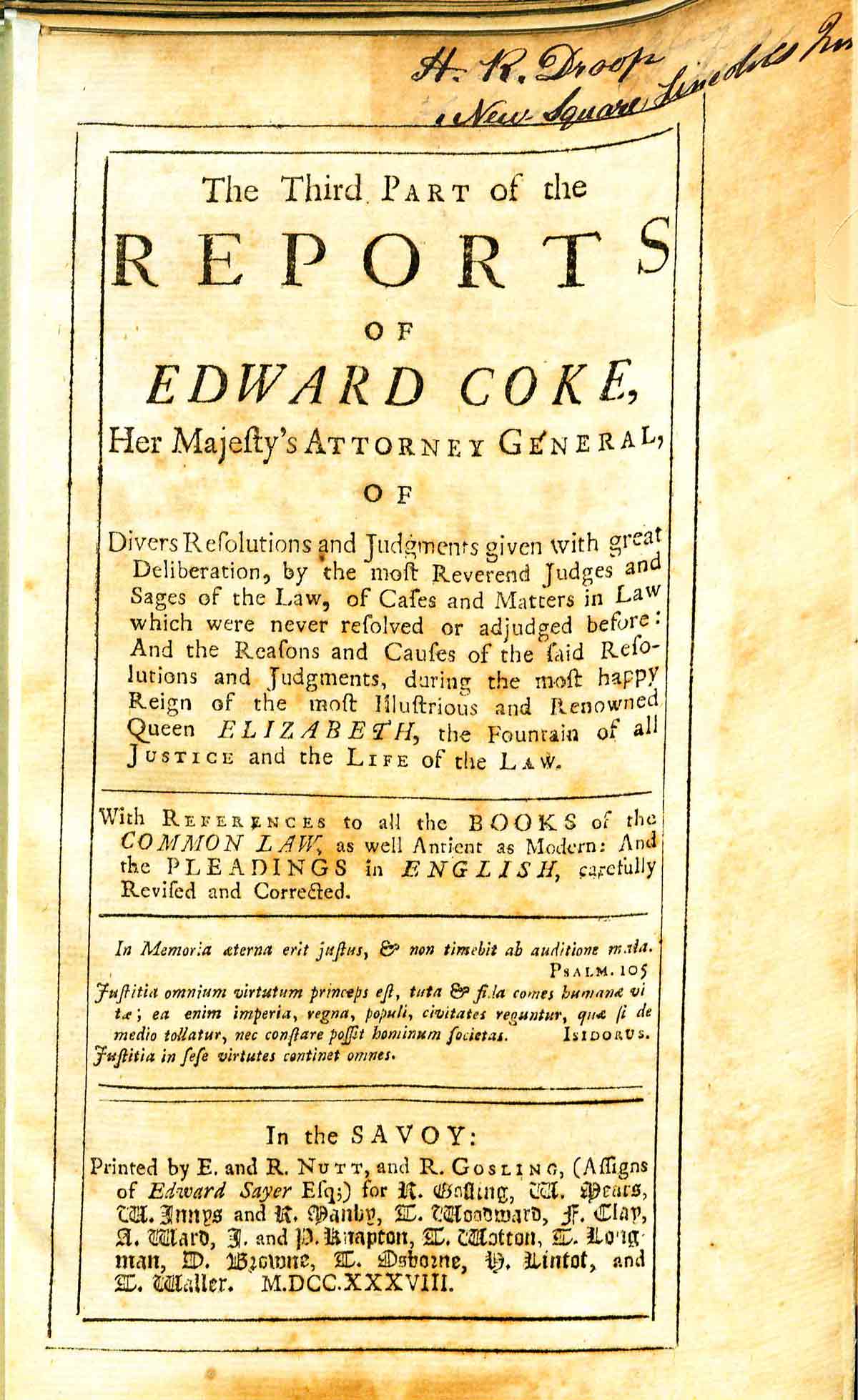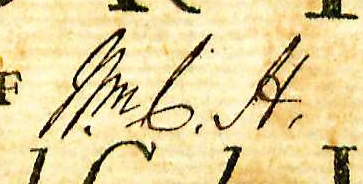Difference between revisions of "Reports of Sir Edward Coke"
Mvanwicklin (talk | contribs) m |
Mvanwicklin (talk | contribs) m |
||
| Line 7: | Line 7: | ||
|vol=volume three | |vol=volume three | ||
|author=[[:Category:Edward Coke|Sir Edward Coke]] | |author=[[:Category:Edward Coke|Sir Edward Coke]] | ||
| − | |publoc=[[:Category:London| | + | |publoc=[[:Category:London|London, In the Savoy]] |
|publisher=Printed by E. and R. Nutt, and R. Gosling, for R. Gosling | |publisher=Printed by E. and R. Nutt, and R. Gosling, for R. Gosling | ||
|year=1738 | |year=1738 | ||
Revision as of 11:42, 15 August 2019
by Sir Edward Coke
| The Reports of Sir Edward Coke | |
|
Title page from The Reports of Sir Edward Coke, volume three, George Wythe Collection, Wolf Law Library, College of William & Mary. | |
| Author | Sir Edward Coke |
| Published | London, In the Savoy: Printed by E. and R. Nutt, and R. Gosling, for R. Gosling |
| Date | 1738 |
| Edition | Whole newly revised and carefully corrected and translated edition |
| Language | English |
| Volumes | 13 parts in 7 volume set |
| Desc. | 8vo (23 cm.) |
| Location | Shelf E-4 |
Born on February 1, 1552 at Mileham, Norfolk, Sir Edward Coke (1552 – 1634) was arguably the most prominent lawyer, legal writer, and politician during the Elizabethan and Jacobean eras, and a defender of the common law over the use of the Stuarts' royal prerogative.[1]
Coke began his studies in 1567 at Trinity College during the years of the Vestiarian controversy—puritan protests against the Church of England. In 1572 he moved on to study at the Inner Temple, where he was admitted to the bar on April 20, 1578. Coke quickly rose to prominence through his successful execution of several noteworthy cases, such as Shelley’s case. Coke's analytical efforts helped to refine the legal doctrines of English law, and his reputation won him a seat in Parliament. He would later become the Speaker of the House of Commons and eventually attorney general.[2] In 1606, after being created serjeant-at-law, Coke was appointed chief justice of the Court of Common Pleas. He was transferred, against his will, to chief justice of the Court of King's Bench in 1613; he also became a member of the privy council.[3]

After several political and judicial skirmishes with James I and Francis Bacon, Coke was suspended from the privy council and removed from the bench in 1616.[4] Although he never returned to the bench, Coke did return to Parliament and was elected to that body four times from 1620 to 1629. During this time he took a lead in creating and composing the Petition of Right. "This document cited the Magna Carta and reminded Charles I that the law gave Englishmen their rights, not the king ... Coke's petition focused on ... due process, protection from unjust seizure of property or imprisonment, the right to trial by jury of fellow Englishmen, and protection from unjust punishments or excessive fines."[5] After this triumph, Coke spent his remaining years at his home, Stoke Poges, working on The Institutes of the Laws of England, another endeavor for which he is rightly famous.[6]
Evidence for Inclusion in Wythe's Library
Wythe definitely owned this title—copies of volumes six and seven of the 1738 edition at the College of William & Mary include his bookplate and an inscription on the inside front board, "Given by Thos. Jefferson to D. Carr, 1806." Surprisingly, Coke's Reports is not listed in the Jefferson Inventory of Wythe's Library as being given to Jefferson's nephew, Dabney Carr. Perhaps this was an oversight on Jefferson's part, or the title appeared on a lost or damaged page. Three of the Wythe Collection sources (Dean's Memo,[8], Brown's Bibliography[9] and George Wythe's Library[10] on LibraryThing) list the 1738 edition of this title.
Description of Wolf Law Library's copy
The George Wythe Collection includes a complete set of Coke's Reports purchased in 2010, and volume six of George Wythe's personal copy. The latter is on permanent loan to the Wolf Law Library from the Earl Gregg Swem Library at the College of William and Mary.
Images of the library's copy of this book are available on Flickr. View the record for this book in William & Mary's online catalog.
Full text
George Wythe's copy, volume 6
Rebound with original boards, featuring six raised bands. Includes the bookplates of George Wythe and Tazewell Taylor of Norfolk, VA, numbered "166". It is also signed "Tazewell Taylor 1842" and is inscribed "Given by Thos Jefferson to D Carr 1806" beneath the Wythe bookplate.
Complete Set
Recent period-style quarter calf over cloth, raised bands and lettering pieces to spines. Includes the inscription "H. R. Droop, New Square, Lincoln's Inn" on the title pages of the first and third parts. Initialed "Wm. C. H." on the title pages to the seventh and ninth parts. Signed "John Hadfield" on the the title pages to the eleventh part and the general index.
See also
- A Book of Entries
- The First Part of the Institutes of the Lawes of England, or, A Commentary upon Littleton
- The Fourth Part of the Institutes of the Laws of England: Concerning the Jurisdiction of the Courts
- George Wythe Room
- Known Surviving Wythe Volumes
- The Second Part of the Institutes of the Laws of England: Containing the Exposition of Many Ancient and Other Statutes
- The Third Part of the Institutes of the Laws of England: Concerning High Treason, and Other Pleas of the Crown, and Criminall Causes
- Wythe's Library
References
- ↑ Encyclopaedia Britannica Online, s.v. "Sir Edward Coke," accessed October 3, 2013.
- ↑ Allen D. Boyer, "Coke, Sir Edward (1552–1634)" in Oxford Dictionary of National Biography, accessed September 18, 2013.
- ↑ Boyer, "Coke, Sir Edward."
- ↑ Encyclopædia Britannica Online, s.v. "Sir Edward Coke."
- ↑ Bill of Rights Institute, s.v. "Petition of Right (1628)," accessed October 3, 2013.
- ↑ Boyer, "Coke, Sir Edward."
- ↑ Boyer, "Coke, Sir Edward (1552–1634)."
- ↑ Memorandum from Barbara C. Dean, Colonial Williamsburg Found., to Mrs. Stiverson, Colonial Williamsburg Found. (June 16, 1975), 10 (on file at Wolf Law Library, College of William & Mary).
- ↑ Bennie Brown, "The Library of George Wythe of Williamsburg and Richmond," (unpublished manuscript, May, 2012) Microsoft Word file. Earlier edition available at: https://digitalarchive.wm.edu/handle/10288/13433.
- ↑ LibraryThing, s.v. "Member: George Wythe," accessed on June 28, 2013


